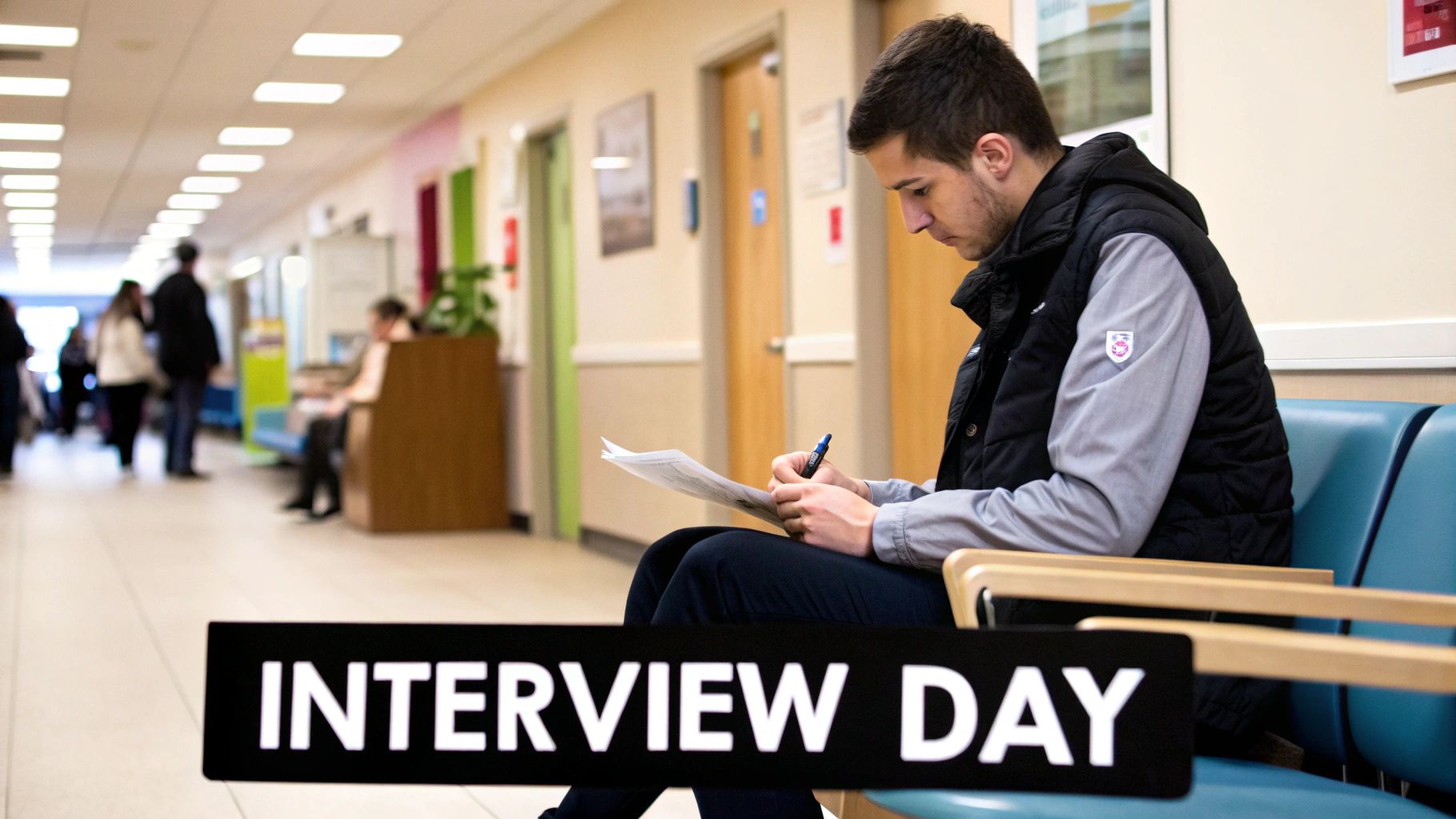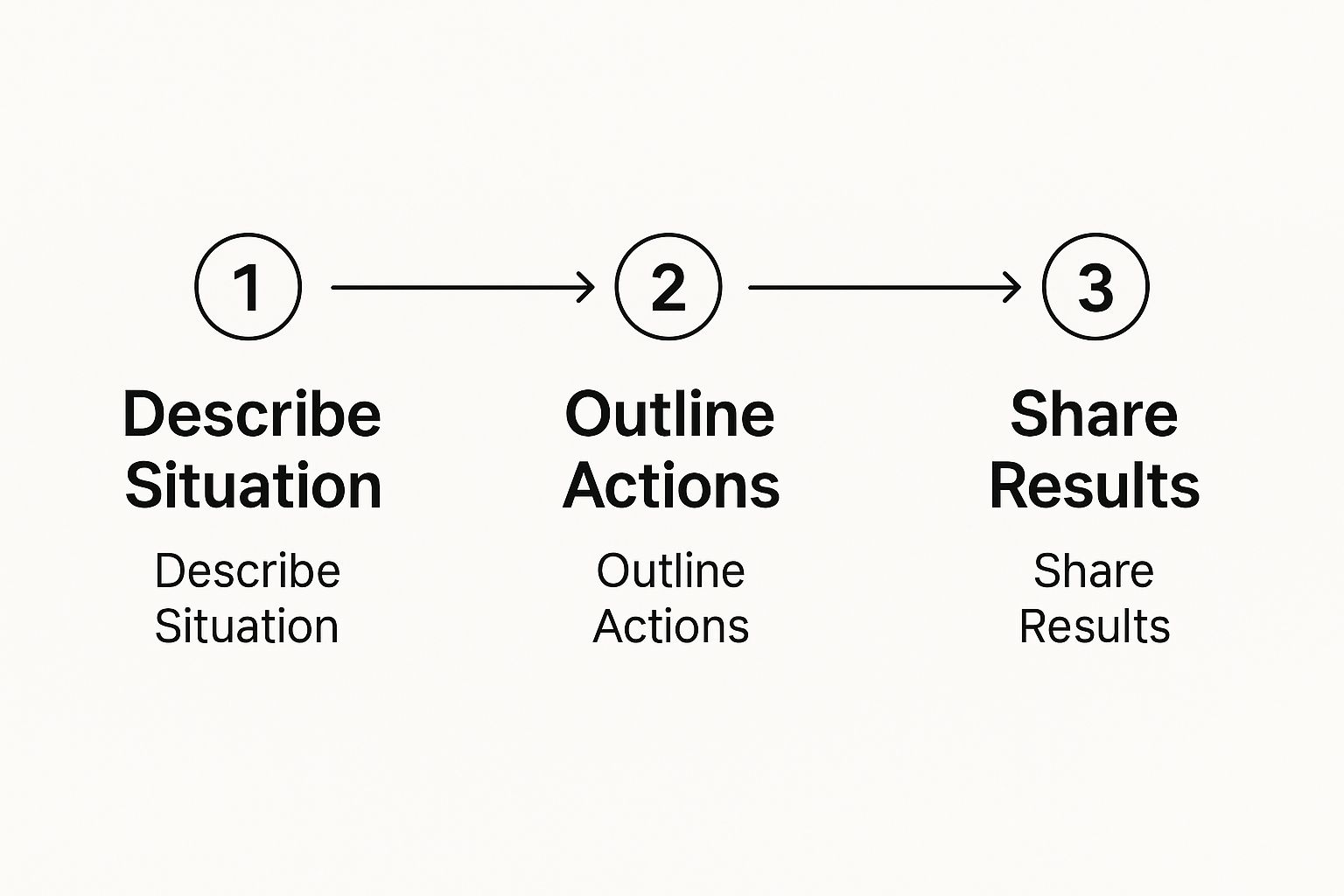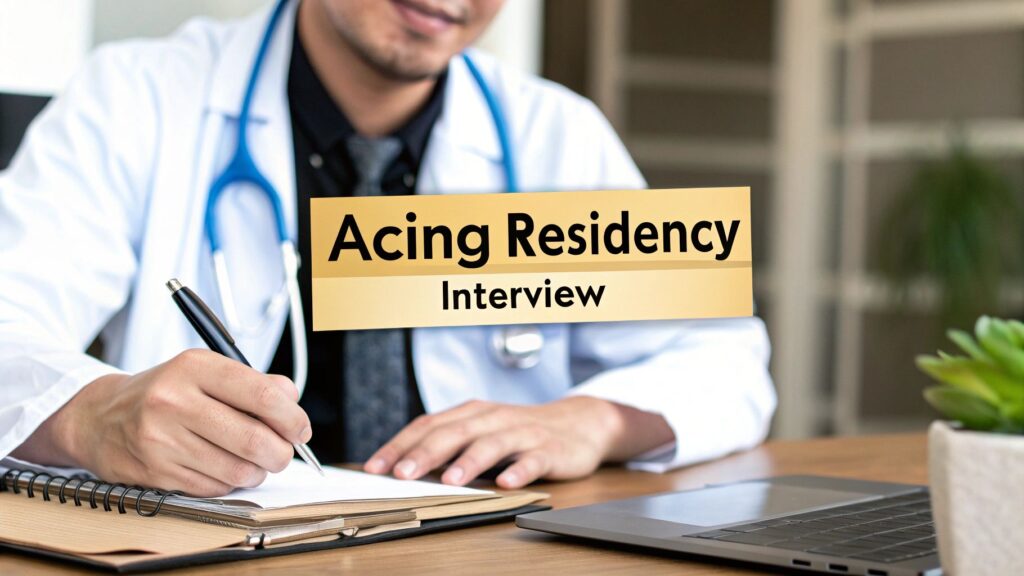Your medical residency interview is the single biggest factor program directors weigh when they build their rank lists. The only thing they value more? Your interpersonal skills—and those are on full display during the interview itself.
After all that work, this is the final, most human step. It’s where your ERAS application transforms from a collection of scores and text into the living, breathing story of the physician you’re meant to be.
Why Your Residency Interview Is So Important

You’ve spent months grinding through your application, chasing down letters of recommendation, and perfecting your personal statement. Getting that first interview invitation feels like you’ve crossed the finish line.
But you haven’t. You’re just starting the final lap of the race.
A stellar application gets you in the door, but it’s your interview performance that lands you a top spot on a program’s rank list. A great interview can make a good application truly shine. A poor one? It can unfortunately sink even the most impressive on-paper credentials.
Looking Beyond the Numbers
This is where programs get to see the person behind the metrics. Your USMLE scores and grades prove you're competent, but the interview reveals if you’re a good fit.
Interviewers are looking for critical qualities that simply can’t be measured on a transcript. They want to know how you think on your feet, communicate under pressure, and connect with others. They're looking for answers to these questions:
- Can you communicate? Are you clear, professional, and articulate?
- Do you have empathy? How do you treat everyone, from the program director to the coordinator who scheduled your interview?
- Are you genuinely interested? Did you do your homework? Do you actually know about the program's mission, culture, and the patients they serve?
- Will you fit in? Does your personality, work ethic, and your set of goals complement the residents and faculty already there?
This is your one shot to showcase the human qualities that make a great physician—resilience, teamwork, and a true passion for your chosen specialty. It's where your application finally comes to life.
Before we dive into the specifics, let's take a quick look at the big picture of what the residency interview aims to accomplish for both sides.
Medical Residency Interview At a Glance
| Interview Component | Primary Goal for Program | Key Applicant Focus |
|---|---|---|
| Traditional Questions | Assess motivation, self-awareness, and passion for the specialty. | Articulate a clear and compelling personal story. |
| Behavioral Questions | Evaluate past behavior to predict future performance. | Use the STAR method to provide specific, impactful examples. |
| "Fit" Assessment | Determine if your personality and goals align with the program's culture. | Show genuine interest through specific, well-researched questions. |
| Communication Skills | Gauge your ability to interact professionally and empathetically. | Practice active listening and maintain professional body language. |
| Interaction with Others | Observe how you treat residents, faculty, and support staff. | Be courteous, engaged, and respectful to everyone you meet. |
This table highlights that the interview is a two-way street—a chance for them to evaluate you and for you to ensure the program is the right place for your training.
The Stakes Have Never Been Higher
Competition for residency spots is fierce and getting tougher every year. The National Resident Matching Program (NRMP) Main Residency Match is now the largest it's been in its 73-year history.
The most recent cycle saw 52,498 applicants register—a 4.1% increase from the year before. With more than 47,000 applicants vying for just over 43,000 positions, every single advantage you can get matters.
This intense competition makes your interview performance absolutely critical. While the fundamentals we discuss here are your foundation, you might want to explore our guide on https://acemedboards.com/medical-school-interview-tips/ for more strategies. Many of the principles for medical school interviews are highly relevant here and will help you build the confidence to stand out and make a lasting impression.
Conducting Deep Program Research That Impresses
Showing up to your residency interview armed with only a vague, surface-level knowledge of the program is one of the quickest ways to sink your chances. It’s a classic mistake, and program directors see it all the time.
They don’t want to hear generic compliments. They want to see that you’ve done your homework and are genuinely invested in what makes their program tick. This is your moment to prove you aren't just looking for any residency—you're looking for this one.
That means you have to go way beyond a quick scan of the program's homepage. Real preparation involves a deep dive into the people, the culture, and the core values that define the institution. It’s all about connecting the dots between your story and their mission.
Beyond the Mission Statement
Every program has a mission statement, but your real job is to figure out how that mission plays out in the real world. Start by dissecting the language they use. Do they lean heavily on community outreach, groundbreaking research, or resident wellness?
Once you have a feel for their priorities, find tangible proof of those values in action. For instance, if a program’s website is filled with talk about serving underserved populations, look for the specific initiatives that back it up.
- Community Clinics: Do they run or partner with free clinics in the area?
- Resident-Led Projects: Are there current residents actively involved in community health projects? You can often find this in resident bios or news sections.
- Global Health Tracks: Do they offer opportunities for international rotations focused on public service?
Connecting your past experiences to these concrete examples is so much more powerful than just saying, "I'm passionate about your mission."
Instead, you can say, "I was really drawn to the resident-led hypertension screening program I read about. It lines up perfectly with the work I did at my medical school's free clinic." See the difference? That comment demonstrates genuine interest and a clear, compelling fit.
Analyzing the People and Their Work
The heart and soul of any residency program are its faculty and current residents. This is where you’ll find the powerful points of connection that will make your conversation stick. As you dig in, using some effective note-taking apps can be a game-changer for keeping all the details straight.
Your research should zero in on a few key areas:
- Faculty Research Interests: Pinpoint two or three faculty members whose work genuinely intrigues you. You don’t need to become an expert overnight, but read the abstracts of their recent publications. Being able to say, "I was fascinated by Dr. Smith's recent paper on…" shows an impressive level of engagement that few applicants will bother with.
- Current Resident Projects: Scour the website for what current residents are up to. Many programs feature resident profiles or research day presentations. This gives you incredible insight into the kinds of opportunities available and the overall culture of the program.
- Recent Program News: Has the program recently landed a new grant, opened a new facility, or been featured in the news? Mentioning this proves you're paying close attention and are up-to-date.
By preparing this way, you completely shift the interview dynamic. You're no longer just another candidate answering questions; you're a potential colleague having an informed, engaging discussion about shared interests. This is how you stand out.
Connecting with Current Residents
While program websites give you the official story, current residents offer the ground truth. Reaching out to them is one of the most valuable research steps you can possibly take. If the program provides resident contact information, use it—respectfully, of course.
Send a brief, professional email introducing yourself and explaining that you're an applicant with a few questions about their experience. Keep your questions focused and specific to avoid taking up too much of their time.
These conversations can give you an honest look at program culture, call schedules, and faculty mentorship that you simply won’t find on a website. The details you gather here will also help you frame your own experiences, much like how you’d meticulously detail them in your application—for a great example of how to do this, check out this helpful sample ERAS application. This insider knowledge will empower you to ask much more insightful questions during your interview, driving home just how serious you are about their program.
Crafting Your Narrative for Key Interview Questions

The questions you'll get during your interview medical residency aren't just a checklist for the program director. They're invitations to tell a story—your story. The candidates who truly stand out don't just give answers; they share compelling narratives that reveal their resilience, passion, and unique path to medicine.
Your mission is to move past stiff, rehearsed scripts. Instead, you'll develop a collection of personal stories that you can adapt to almost any question that comes your way. This is how you sound prepared yet completely authentic. Learning the principles of crafting a captivating narrative can help you frame your experiences in a way that genuinely connects with your interviewers.
Building Your Core Stories
Before you can answer anything, you need to dig into the experiences that have shaped you. These are the make-or-break moments from med school, research projects, volunteer work, or even your personal life that show off crucial qualities like teamwork, problem-solving, and empathy.
Think about times when you:
- Faced a major challenge and pushed through it.
- Were part of a team tackling a tough goal.
- Connected with a patient in a way that stuck with you.
- Made a mistake and learned a hard lesson from it.
These moments are the building blocks of your interview answers. By thinking them through now, you won't get caught flat-footed, scrambling to recall a relevant example under pressure. You'll have a mental library of powerful experiences ready to go.
The Power of the STAR Method
One of the best ways to structure these stories is with the STAR method. This simple framework keeps your answers clear, concise, and impactful, saving you from rambling. It breaks your experience down into four key parts:
- Situation: Quickly set the scene and give some context. What was the challenge?
- Task: What was your specific responsibility or goal in that situation?
- Action: Detail the concrete steps you took to handle it. This is your chance to showcase your skills and thought process.
- Result: Explain the outcome. What happened because of your actions? What did you learn?
Using this structure transforms a bland statement into a memorable story that proves your abilities far more effectively than just claiming them.
A well-told story using the STAR method does more than just answer the question—it gives the interviewer a window into how you think, act, and learn. It makes your experiences memorable long after the interview is over.
Transforming Answers Into Narratives
Let’s see this in action. Take the classic question, "Tell me about a time you worked in a team."
A generic, forgettable answer might be: "I worked on a research project with a team in medical school. We collaborated well and published a paper." While it's true, it offers zero insight into who you are.
Now, let's rebuild it using the STAR framework.
From Generic to Impactful The STAR Method in Action
| STAR Component | Narrative-Driven Answer |
|---|---|
| Situation | "During my third-year research block, my team hit a wall. We were struggling to reconcile conflicting data from our study on patient readmission rates, and our presentation deadline was just two weeks away." |
| Task | "My specific role was to re-evaluate our methodology. I needed to pinpoint the source of the discrepancy and figure out a plan to get our project back on track before the deadline." |
| Action | "I took the initiative to review every data set individually, meticulously cross-referencing patient charts with our collected info. I found an inconsistency in how we were classifying comorbidities. I developed a standardized protocol, got the team on board, and then led the re-analysis of the data over a weekend." |
| Result | "Because of that, we identified a clear correlation we had totally missed before. We not only met our deadline, but our findings were strong enough to be accepted for a poster presentation at a regional conference. That experience taught me just how critical meticulous detail and proactive problem-solving are in a team setting." |
See the difference? This detailed response doesn't just say you’re a team player; it proves it with a concrete, memorable story. It highlights your initiative, analytical skills, and leadership—all without you needing to use those buzzwords. By preparing a handful of these powerful narratives, you can confidently navigate your interview medical residency and leave a lasting, positive impression.
How to Handle Behavioral and Ethical Questions
Sooner or later, it’s going to happen. You’ll be in a residency interview, and they’ll hit you with a tricky behavioral or ethical scenario. It’s a classic move. Programs love to see how you think on your feet when there’s no easy answer.
They aren't trying to catch you in a lie or stump you. They want a window into your real-world judgment. How do you handle a conflict with a senior resident? What’s your gut reaction to a medical error? Your response to these questions says far more about your character and professionalism than any test score ever could.
The goal isn't to have a perfect, pre-written answer. It's about showing you have a reliable framework to break down a complex problem, even under pressure.
Developing Your Ethical Framework
When an interviewer throws you a tough scenario, they want to see your thinking process out loud. Don't just jump to a conclusion. Walk them through your logic, step-by-step.
- Pinpoint the Core Issue: First, what's really at stake here? Is it a patient safety problem? A professional disagreement? A resource issue? State the central conflict clearly.
- Identify Everyone Involved: Think bigger than just you and the patient. Who else is affected? Consider the patient's family, the attending physician, the nursing staff, and even the hospital administration.
- Lay Out Your Options: Talk through a few potential courses of action. It's powerful to discuss the pros and cons of at least two different approaches. This shows you see the nuances and aren't just reacting.
- Commit to a Path and Explain Why: State your final decision. Most importantly, justify it. Reference core medical principles like patient autonomy, beneficence, and your commitment to professionalism.
This structured approach demonstrates maturity and a methodical mind—exactly what they're looking for in a resident. Many applicants find a version of the STAR method helps organize their thoughts, especially for behavioral questions based on past experiences.

This simple flow helps turn your stories into compelling proof of your problem-solving skills, rather than just anecdotes.
A Real-World Scenario Analysis
Let’s put this into practice. Imagine they ask: "You realize your attending has made a mistake in a patient's medication order that could cause harm. What do you do?"
A panicked response might be to immediately confront the attending. A thoughtful one is different.
You'd start by stating that your absolute priority is patient safety. You would then explain how you'd address it—by politely and privately asking the attending for a moment to "clarify the order," framing it as a question for your own learning. This approach respects the hierarchy while protecting the patient. It shows tact, a skill you’ll need every single day.
The interviewer is less interested in the "correct" answer and more interested in how you arrive at your conclusion. They want to see that you can balance patient safety, team dynamics, and professional respect all at once.
Getting good at this means practicing your thought process, not memorizing lines. To get a feel for common challenges, it's a good idea to review essential video interview questions, including behavioral and situational types. This can give you invaluable insight and help you practice.
The pressure of these interviews can feel particularly intense for certain applicants, like international medical graduates (IMGs). The numbers don't lie. Recent data shows that while U.S. citizen IMGs achieved a 67.8% PGY-1 match rate, the rate for non-U.S. citizen IMGs was just 58.0%. This comes even as the number of non-U.S. IMG applicants surged by 14.4%. For these candidates, a masterful performance on ethical questions isn't just a bonus—it's a critical way to stand out.
Mastering Post-Interview Communication

The final handshake or video call doesn't mark the end of your evaluation. Far from it. Your follow-up is a critical final touchpoint, a chance to reinforce your interest and polish your professional image.
A thoughtful, well-executed communication strategy can leave a fantastic lasting impression. On the flip side, a clumsy or generic one can subtly undermine an otherwise great interview performance. How you handle this final step in the interview medical residency process speaks volumes about your maturity, organization, and genuine enthusiasm for the program.
The Art of the Thank-You Email
Sending a thank-you note isn’t just a formality; it's a strategic move. Your goal is to be memorable for all the right reasons. A well-crafted email should land in their inbox promptly, ideally within 24 to 48 hours of your interview.
This note absolutely must be personalized and concise. Program directors can spot a copy-paste job from a mile away, and it's a major red flag about your actual level of interest.
Here’s what to include in a powerful thank-you email:
- A Specific, Personal Connection: Mention something unique from your conversation. Did you and a faculty member discuss their recent research on diabetic nephropathy? Or a shared passion for medical education? Referencing this proves you were actively listening and engaged.
- Reinforce Your Interest: Clearly state your continued strong interest in their program. Go a step further by briefly linking one of its specific features—like a particular global health rotation or a community clinic you're excited about—to your own career goals.
- Professional Closing: Keep it professional and to the point. Thank them again for their time and consideration.
It's best practice to send individual, tailored emails to each person who interviewed you. If you had a panel interview, send a personalized note to the program director and consider a more general one to the program coordinator, thanking them for their help with logistics.
Navigating the Letter of Intent
Later in the season, as you're agonizing over your rank order list, you might consider sending a letter of intent (LOI). This is a powerful but often misunderstood tool. An LOI is a formal, one-time declaration that you are ranking a specific program as your #1 choice.
A letter of intent should only be sent to ONE program. Sending it to multiple programs is an ethical breach that can severely damage your reputation if discovered.
Don't take this communication lightly. Program directors have shared that a genuine, heartfelt letter of intent can sometimes tip the scales for a candidate who is on the bubble between two spots on their list.
When Is a Letter of Intent Appropriate?
| Send an LOI If… | Do NOT Send an LOI If… |
|---|---|
| The program is unequivocally your #1 choice. | You are still undecided about your top choice. |
| You have a significant update to share (e.g., a new publication). | You have nothing new to add beyond your interest. |
| You want to express your strong fit with the program's culture. | You are sending it to every program you liked. |
The timing of an LOI is key. Aim to send it in late January or early February, right around the rank order list certification deadline. This ensures your letter arrives when program directors and faculty are actively finalizing their lists.
Keep the letter to a single page, reiterate the specific reasons they are your top choice, and reaffirm that you will be ranking them first. When done correctly, this final piece of communication can be the confident, professional closing statement to your successful interview season.
Answering Your Top Residency Interview Questions
As you get closer to your interview medical residency, you're bound to run into specific questions and tricky situations that can throw you off your game. The key is to navigate these moments with confidence and professionalism. Let's tackle some of the most common questions applicants have, with clear, actionable advice to make sure you're ready for anything.
What Should I Wear for a Virtual Residency Interview?
Even though you’re behind a screen, professional business attire is absolutely non-negotiable. You have to treat a virtual interview with the same level of seriousness as an in-person one. For men, that means a full suit. For women, a suit or an equivalent professional outfit is the standard.
Dressing the part isn't just about appearances; it shows genuine respect for your interviewers, the program, and the entire process. It’s a clear signal that you understand the gravity of the day.
But your outfit is only half the picture. Your background is just as critical. Make sure the space behind you is clean, uncluttered, and free of any potential distractions. A neutral wall, a tidy bookshelf, or a professional-looking virtual background are all solid choices. Always, always do a test run with your camera to check your lighting, camera angle, and overall presentation before the real thing.
How Do I Answer the Greatest Weakness Question?
This question trips up countless applicants, but it's really a golden opportunity to show self-awareness and a commitment to growth. The absolute worst thing you can do is lean on a tired cliché like, "I'm a perfectionist" or "I work too hard." Interviewers have heard these a thousand times, and they just come across as disingenuous.
Instead, use a simple, three-part strategy for a much more powerful and honest response:
- State a Genuine, Minor Weakness: Pick a real, manageable weakness you've actually worked on. Maybe you used to be hesitant to ask for help, or perhaps you initially struggled with delegating tasks on a team project.
- Provide a Specific Example: Briefly describe a real situation where this weakness had a tangible, negative effect. This makes your answer credible and shows you're not just making something up.
- Detail Your Improvement Plan: This is the most important part. Explain the concrete steps you've taken to address this weakness and the progress you've made. This completely reframes a potential negative into a compelling story about your maturity and drive to improve.
This structure proves you're reflective and proactive—two qualities every program director is looking for in a resident. If you want more tips on framing your answers, check out our detailed guide on the 7 common residency interview questions you should know.
Is It Okay to Take Notes During the Interview?
Yes, it is perfectly fine to take notes. In fact, it can even be a positive signal to your interviewers. Having a notepad and pen handy to jot down an interviewer's name, a key program detail, or a question you want to circle back to shows that you're engaged, attentive, and organized.
Taking notes shows you value what the interviewer is saying. The key is to do it skillfully, so it enhances your engagement rather than detracts from it.
The secret is to not let your notes become a crutch or, worse, a script. You absolutely must maintain frequent and natural eye contact. Your notes are for quick, brief references—never read your answers directly from the page.
For virtual interviews, it's a smart courtesy to mention it at the start. A simple, "Just so you know, I may be taking a few notes during our conversation to stay organized," is a professional way to explain where your eyes might occasionally go. It's a small gesture that shows foresight and great communication skills.
How Many Programs Should I Rank?
This question causes a lot of anxiety, but the data here gives a very clear direction. While there's no single "magic number," statistics from the National Resident Matching Program (NRMP) consistently show a strong correlation: applicants who rank more programs have a higher probability of matching.
However, this doesn't mean you should just rank every single program you interviewed with. The cardinal rule is to only rank programs you would genuinely be happy and willing to attend. Your rank order list needs to be your true, honest order of preference.
Never try to "game the system" by ranking a program you think is "safer" higher than one you truly love. The matching algorithm is designed to work in your favor; it tries to place you in the highest-ranked program on your list that also ranked you. Putting a program you like less at the top only increases your odds of ending up there, potentially costing you a spot at a program you actually preferred.
The best strategy is simple: interview broadly, then rank every program you'd accept a position from, in your true order of preference—from your absolute #1 dream spot down to the last one you'd be happy with.
At Ace Med Boards, we know that acing your residency interview is the final, critical step toward your dream career. Our expert tutors provide one-on-one coaching and mock interviews to help you craft compelling narratives, handle tough questions with confidence, and make a lasting impression on program directors. Move forward with the confidence that you are fully prepared to succeed. Start your journey today at https://acemedboards.com.

